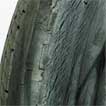Tire Replacement Guidelines
�and Sidewall Weathering
Tire Replacement Guidelines
Time in Service v. Time in Years
It is impossible to predict when a tire should be replaced based on its calendar age alone. Although no widely accepted scientific research exists to show that chronological aging alone adversely affects a tire, and if so, how those effects occur, over what time period, etc., the longer a tire is in service, the more opportunities there are for it to be exposed to adverse environmental or service conditions. Therefore, the older a tire the greater the chance that it will need to be replaced due to service-related or storage conditions.
Tire Replacement – 6 Years in Service
While most tires will be replaced sooner, Goodyear recommends that any tire in service (meaning inflated and mounted on a rim of your vehicle, including your spare tire regardless of whether that tire is in contact with the roadway) 6 years or more be replaced even if such tire appears serviceable and even if it has not reached the legal treadwear limit. If you are unable to determine the date a tire was first placed in service, then you should rely on the DOT code stamped on the tire and ensure that any tire which was manufactured more than 6 years ago is removed from service (see below for how to read a tire's DOT code). Tires that should otherwise be replaced based on wear, damage or any other factor should not be kept in service regardless of the date they were first placed in service or their date of manufacture. Also, consumers should never purchase or install used tires of any age on their vehicle as the service, maintenance and storage of used tires is largely unknown.
Automobile Manufacturers' Recommendations
Various automobile manufacturers have published statements and instructions regarding tire service life, which include tire replacement recommendations based on chronological age. Goodyear advises that consumers refer to their owners' manuals for guidance on the vehicle manufacturer's replacement recommendations (but regardless of any such vehicle manufacturer's advice, any tire's replacement period should not exceed 6 years from the date the tire is placed in service or 6 years from the date included in the DOT code on the sidewall of the tire if you are unable to determine the date the tire was first placed in service).
Sidewall Weathering
Weather cracking is a naturally occurring condition that results from exposure to heat and sunlight. Goodyear's warranty
for weather cracking is four years from purchase date (or four years from manufacture date if proof of purchase is not
available).
Weather cracking is common in RV tires from all manufacturers.

- Appears as crazing and or cracking in the flex area of the sidewall
- Probable causes of sidewall weathering
- — Long periods of inactivity or storage
- — Direct exposure to air and sunlight
- — Exposure to high levels of ozone (smog, electrical generators)
- — Excessive washing or dressing using alcohol or petroleum based cleaners
When should the tire be replaced?
- Cracks > 2/32" deep
- Internal components of tire (steel or fabric body plies) are visible
Without evidence of weather cracking, use the following as a gauge:
- Usage per year --More frequent usage will result in longer life
- Vehicle storage practices (6 months loaded with little or no rotation is not good!)
- Casing quality --Absence of repairs, liner wrinkles, weather cracking, sidewall scuffs or cuts
Tread Depth
Tread depth is an indication of whether the tire can safely remain in service. Less than 6/32" tread depth may require
replacement to maintain sufficient traction and handling performance. Consult your local Goodyear RV tire retailer to confirm
that your tires need replacement if you measure less than 6/32" tread depth remaining.
Casing Quality
Satisfactory casing quality is another gauge of a tire's overall condition. Casing quality relates to inner liner wrinkles,
tire repairs or any visual signs of tire abuse (sidewall cuts or scuffs etc).